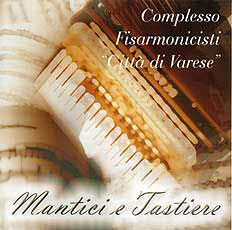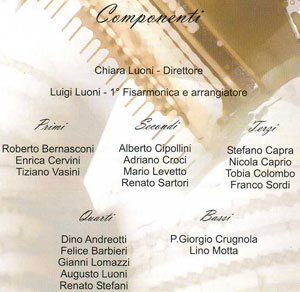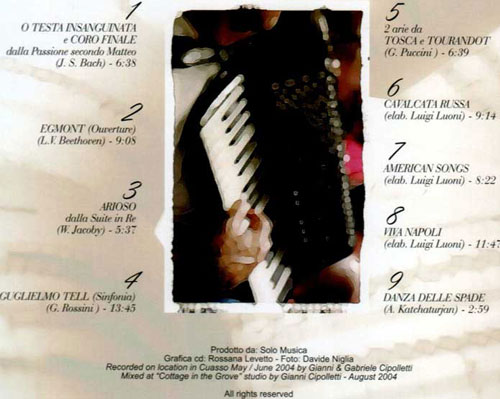Bellows and Keyboards  Imagine a story where the winner is passion. It is significant to know that
this accordion orchestra is composed entirely of amateurs; amateurs that
with the above mentioned passion find the necessary free time for their
music.
Imagine a story where the winner is passion. It is significant to know that
this accordion orchestra is composed entirely of amateurs; amateurs that
with the above mentioned passion find the necessary free time for their
music.Let us first review the history of this orchestra. One of Italy's greatest accordion teachers, Laura Benizzi, started her accordion school in the city of Varese and founded the original all accordion orchestra in 1948. Numerous talents were developed as a result of this musical activity including Luigi Luoni, World Champion in 1957 at Helmond, Netherlands. However, in 1961 Prof. Benizzi relocates to Rimini (350 km to the south) and the orchestra disbands. But the passion doesn't die, the embers keep kindling like hot coal and relight a flame when Luigi Luoni reforms the group in 1984. Later, in 1987, Luigi's daughter Chiara, an accomplished pianist and graduate of the Conservatory of Padova , joins the group as Director. Luigi remains as First Accordion and adapter/arranger of the transcriptions. The great passion that motivates this group, primarily devoted to it's concert activity, also keeps alive the reminders of the group's history and significant milestones. They celebrated the 10 years after the re-founding, the 90th birthday of Prof. Benizzi (with a concert trip to Rimini), the 50th anniversary of the original formation, and now, with this CD, the 20th year since the re-founding.  Despite the excellent graphics of the CD-booklet , a photo of the musicians
is not included. This is another sign of the intention to provide purely
a musical deposition of how music can motivate unity among people. The repertoire
introduces great classics (Bach, Beethoven, Rossini, Puccini, Katchaturjan),
an original piece ("Arioso" by Wolfgang Jacobi) and medleys of
popular Russian Songs, American Songs, and Neapolitan Songs.
Despite the excellent graphics of the CD-booklet , a photo of the musicians
is not included. This is another sign of the intention to provide purely
a musical deposition of how music can motivate unity among people. The repertoire
introduces great classics (Bach, Beethoven, Rossini, Puccini, Katchaturjan),
an original piece ("Arioso" by Wolfgang Jacobi) and medleys of
popular Russian Songs, American Songs, and Neapolitan Songs.A typical repertoire for an accordion orchestra of this type (perhaps the only exception is the excerpt from the Passion according to Mathew by J.S.Bach) which for the difficult pieces like Beethoven or Rossini not only highlights the effort of the players but also the timbre limitations of the classic reed accordions. Remember the individual and group passion of this "complesso" and take note that the perspective emphasized must be that of the player. The satisfaction is to perform "Egmont" or "William Tell" with friends who have the same love for this instrument, this music and this repertoire. The enjoyment to actively participate and present this type of repertoire; exactly what is lacking in today's society. |
|||||||||||||
